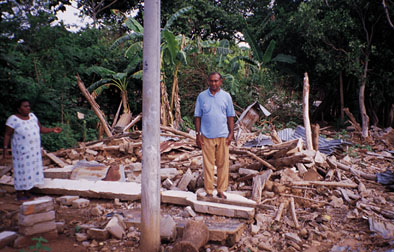In October 2001, Colombia Solidarity Campaign member Richard Solly visited la Guajira in the far north of Colombia to look at the impact of the Exxon-operated coal mine at Cerrejon Norte a year after his first visit to the area. 
On 9th August 2001, agents of mining company Intercor, a wholly owned subsidiary of ExxonMobil, assisted by Colombian police and military, demolished 29 houses in the small farming community of Tabaco in La Guajira. (See ‘Tabaco Attacked’ in the October-December 2001 edition of Colombia Solidarity.) They wrecked the surrounding fruit trees and gardens, confiscated people’s possessions and injured several of those who resisted. The company wants the community to get out of the area so that it can expand its coal strip mine at El Cerrejon Norte ¯ the biggest strip mine in South America. It was tired of the community’s demand for a relocation agreement which would enable community members to continue living together and farming.
On 20th October, I attended a community meeting in Tabaco in which residents were informed about the progress of their legal case against Intercor and of actions taken by solidarity organisations in Britain and the USA. Residents told me about the events of 9thAugust. I photographed some of the damage done to people’s houses by the company. Residents told me that during the demolition, some of them were beaten with wooden clubs, mostly branches torn from the surrounding trees. One of the women said that she saw police beating one man round the head with a wooden club and that when his daughter went to his aid, she was beaten around the legs. Both were wounded. Emilio Perez was attacked by fifteen men ¯ either policemen or Intercor security personnel ¯ as soon as he left his house. He was clubbed unconscious and left on the ground. He spent eight days in hospital and was still suffering from bad headaches and forgetfulness. Another woman had been hit in her side by a rock thrown by one of the security personnel. Her side was still painful. Her husband had been attacked too. He had fought back, and because of his agility in struggling against his attackers, they said that he must be a guerrilla ¯ a false accusation which, in the current circumstances in Colombia, could lead to police reprisals or paramilitary attack. The police attempted to wound his eyes, which became covered in blood as they beat him. Some of those whose houses were demolished were sick, including the children of the president of the Relocation Committee, Jose Julio Perez.
During the demolition, the houses of those perceived as leaders of resistance to Intercor were demolished first, then the houses of those who followed those leaders. The house of one family that had been friendly to the company was left standing while the next house was destroyed. The process was clearly discriminatory. It was not the result of a properly constituted legal eviction process but a most aggressive form of pressure against people resisting the company’s demands.
After demolishing 29 houses, the Intercor workers stopped. It may only have been the people’s resistance, the presence of journalists, and the flurry of email protests from the community’s supporters in Britain and United States, that stopped them destroying more. But they threatened to come back and demolish more houses, together with the school and other public buildings. They struck again without warning in mid-December, and again in late January.
Shortly before the 20th October meeting, the community’s lawyer, Armando Perez Araujo, had a meeting in Bogotá with the Fiscal General (Attorney General), who had agreed that the actions of Judge Carolina Martinez Padilla on 9th August, allowing the forced evictions to go ahead, were illegal. Armando felt that there were grounds for hope that Martinez Padilla would be prosecuted and jailed. The Minister of the Interior spoke supportively of a proper relocation programme. Armando therefore lodged a formal Denuncia against the judge. The case was finally heard the week after the second round of demolitions in Tabaco. The judgement went against Armando. On 20th December, he was arrested and detained for ‘Falsa Accusation’. He remained under house arrest until 25th January.
Meanwhile, Tabaco residents are getting desperate because of their dire economic situation, and people are selling out one by one to Intercor. The company is exerting psychological pressure on people, contacting them individually and promising a payment of 2,400,000 pesos (just over US$1,000 or £700) if they repudiate Armando Perez as their lawyer and move out. The sum is wholly inadequate to enable people to move to premises where they can live and continue farming but the company says that it cannot and will not pay more and that the community’s expectations are completely unrealistic. People feel that they are faced with a choice between inadequate compensation and no compensation. Often, if a family believes that it has got the best deal possible under the circumstances, it will not remain in solidarity with those struggling with the company. Intercor knows this and exploits it deliberately.
ExxonMobil has just announced plans to sell Intercor to its partners in the El Cerrejon Norte joint venture, Anglo-American, BHP-Billiton and Glencore. The focus of campaigning therefore has to shift from the US-based Exxon to these other mining behemoths.

